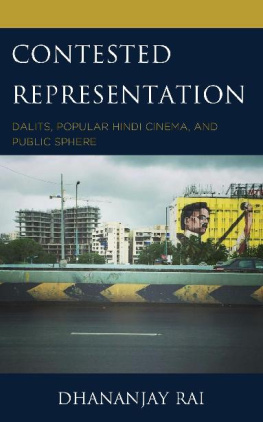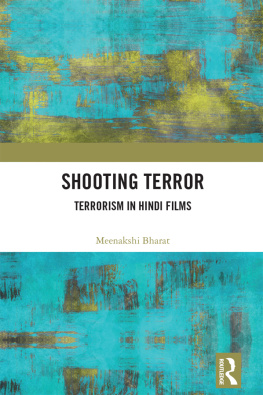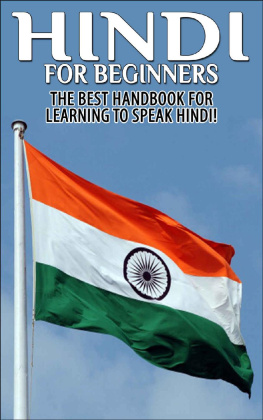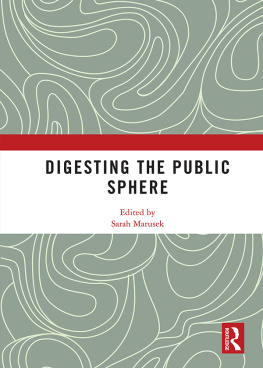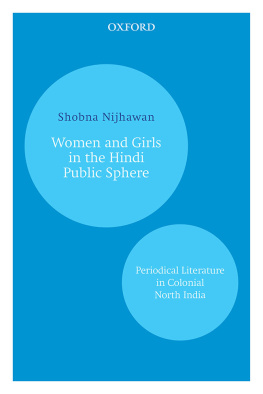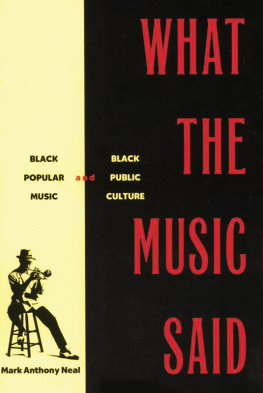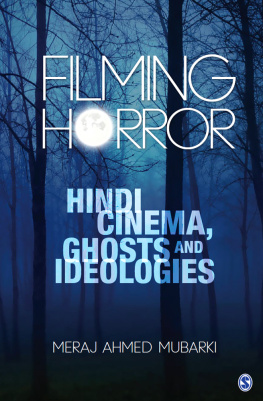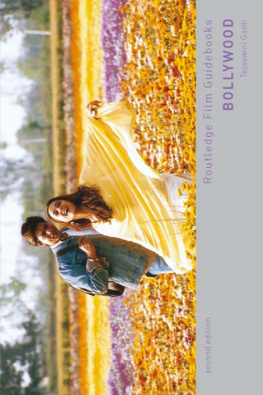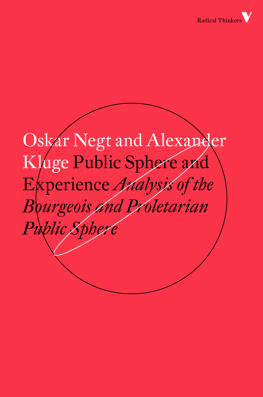Contested Representation
Contested Representation
Dalits, Popular Hindi Cinema, and Public Sphere
Dhananjay Rai
LEXINGTON BOOKS
Lanham Boulder New York London
Published by Lexington Books
An imprint of The Rowman & Littlefield Publishing Group, Inc.
4501 Forbes Boulevard, Suite 200, Lanham, Maryland 20706
www.rowman.com
86-90 Paul Street, London EC2A 4NE
Copyright 2022 by The Rowman & Littlefield Publishing Group, Inc.
All rights reserved. No part of this book may be reproduced in any form or by any electronic or mechanical means, including information storage and retrieval systems, without written permission from the publisher, except by a reviewer who may quote passages in a review.
British Library Cataloguing in Publication Information Available
Library of Congress Cataloging-in-Publication Data on File
ISBN 978-1-66690-133-7 (cloth : alk. Paper)
ISBN 978-1-66690-134-4 (electronic)

The paper used in this publication meets the minimum requirements of American National Standard for Information SciencesPermanence of Paper for Printed Library Materials, ANSI/NISO Z39.48-1992.
To Sanjay Rai, my brother, who eagerly waited for the completion of this work; passed away in 2021 & Aanya, who joined us in 2020.
Contents
The book is an outcome of collective endeavours. The theme of the book germinated at the University of Delhi, Delhi. The doctoral work was completed at the Centre for Political Studies, Jawaharlal Nehru University, New Delhi. The present contour of the book has materialised at the Central University of Gujarat, Gandhinagar. I am grateful to my teachers, friends, colleagues and institutions for immense help and constant encouragement.
During my research work, Prof Manindra Thakur insisted on totalised ontology (comprehensive understanding of reality) over de-totalised ontology (partial understanding of reality). His unqualified support and critical comments proved immensely valuable for my doctoral thesis. Prof Gopal Guru made me realise the nature, significance and utilities of theories during my research years at the University of Delhi and Jawaharlal Nehru University. He immensely encouraged us to think beyond established norms and institutions. Prof Anupama Roy offered the much-needed critical comments on the contour of research. Prof Gurpreet Mahajans critical observation and clarity on innumerable occasions were crucial. Prof Valerian Rodriguess generous remarks and critical comments were helpful for conceptual clarification.
Prof Sudha Pai, Prof Pralay Kanungo and Prof Vidhu Verma extended discursive support. Prof Pralay Kanungos many interventions rectified my various follies. I am grateful to Prof Vidhu Verma for unravelling many hidden layers of popular Hindi cinema during my research. The frequent engagements with Dr Ajay Gudavarthy, Dr Amir Ali, Dr Rinku Lamba and Dr Rajarshi Dasgupta were the most fructuous and memorable enterprise. Dr Ajay Gudavarthy exposed me to various aspects of the cultural sphere. Dr Amir Alis encouragement and conversations were enlightening. Dr Rinku Lamba commented on many aspects of my work and acquainted me with the nuances of social spheres. Dr Rajarshi Dasgupta pointed out some of the limitations of postulations.
Prof Manoranjan Mohanty, Prof Bidyut Mohanty and Prof Ujjwal Singh reminded me to complete this work on several occasions. Prof Manoranjan Mohantys reminder that where is your own work and Prof Ujjwal Singhs reminder that please focus on one idea at a time helped me concentrate and complete this work. Prof N. Sukumars observation, comments and interactions were immensely valuable on several occasions. Prof Vivek Kumar and Dr Harish Wankhede compelled me to think afresh about cinema and Dalits. I am highly indebted to Prof Neera Chandhoke, Prof M. P. Singh, Prof Akhil Ranjan Dutta, Prof Satish Jha, Prof Dharmendra Kumar, Prof Savita Singh, Dr Hilal Ahmed, Dr Ishwar Singh Dost, Deependra Baghel, Dr Sudhir Kumar Suthar, Dr Shailaza, Dr Kamal Nayan Choubey, Dr Indrajeet Jha, Dr Manjur Ali, Dr Abdul Ansari, Dr Prashant Trivedi and Sheeba Aslam Fehmi for posing new questions and readings.
I am also thankful to Prof G. Haragopal and Prof M. Madhava Prasad for providing succinct comments as external examiners of the doctoral thesis. In addition, two anonymous referees of the manuscript provided much-needed critical comments. Finally, during the research, the fellowship provided by the University Grants Commission, India, was a much-needed respite.
In Gujarat, constant interactions with Prof Y. K. Alagh, Prof Thomas Pantham, Prof Ghanshyam Shah, Prof Sudarshan Iyengar, Prof E. V. Ramakrishnan, Prof N. Rajaram, Prof Ajay Dandekar, Prof Lajwanti Chatani, Prof Deeptha Achar, Dr Santosh Dash, Dr Sadan Jha, Dr Amarendra Pandey, Dr Vikram Amarawat, Dr Nitesh Chaudhary, Dr Kunal Kishore, Dr Ilias Mansuri, Dr Smruti Ranjan Dhal, Prof Prem Anand Mishra , Dr Om Prakash Dwivedi, Dr Beryl Anand, Dr Jagannatham Begari, Dr Priya Ranjan Kumar, Dr Vandana Parmar and Dr Vikas Pathe compelled me to revise several postulations. Colleagues at the Central University of Gujarat provided much-needed academic ambience. My postgraduate students and MPhil and PhD scholars enriched my academic journey by way of critical engagement and numerable suggestions. Dr. Pawan Kumar, Manas Kandi, Akash Singh Thakur and Dr. Jyotasana extended valuable academic inputs in multiple ways.
I express my deep gratitude to Prof R. K. Kale (the first vice chancellor, Central University of Gujarat), who constantly reminded me about everyday reading and substantive research pursuits.
Prof R. S. Dubey (vice chancellor, Central University of Gujarat) encouraged research work and provided much-needed critical insights on several postulations. His constant motivation and reassurance were of much help.
I am also grateful to the organisers for inviting me to present some parts of the research: Association of Asian Studies and Thammasat University, Bangkok, Thailand (14 July 2019); Foundation for Creative Social Research and India International Centre, New Delhi (56 September 2014); M. D. Gramseva Mahavidyalaya, Gujarat Vidyapith, Sadra, Gandhinagar (2425 March 2014); Department of Sociology in collaboration with the Centre for Culture Media and Governance, Jamia Millia Islamia, New Delhi (21 March 2011); Council for Social Development, Indian International Centre, New Delhi (1214 February 2009).
Jawaharlal Nehru Libraries (Central Library, the Exim Bank Library, SAP Library/CPS), University of Delhi Libraries (the Ratan Tata Library and the Central Library), The Nehru Memorial Museum and Library (NMML) and the Central University of Gujarat Library have been immensely useful. I thank staff members for their kind help. Dr K. B. Agadi provided all possible help at the Central University of Gujarat Library. I am grateful to Mittal Solanki for her keen interest in the work and Chirag Galundia for the cover image.
I am thankful to my father, father-in-law and mother-in-law, brother and sister for constant support. They have been my strength throughout this research. Unfortunately, my brother passed away just before the completion of this work. He was the crucial factor behind my higher education pursuit.
In this two-staged journey (doctoral research and book), Rityusha Tiwary, my partner, has been a pillar of strength. Her editing, scathing comments, square repudiation and decisive modifications of arguments not only questioned my oft-repeated arguments but also proved to be much-required interventions. Moreover, she stood by me in hours of crisis and helped to overcome it. I am indebted for her unwavering support.
 The paper used in this publication meets the minimum requirements of American National Standard for Information SciencesPermanence of Paper for Printed Library Materials, ANSI/NISO Z39.48-1992.
The paper used in this publication meets the minimum requirements of American National Standard for Information SciencesPermanence of Paper for Printed Library Materials, ANSI/NISO Z39.48-1992.
